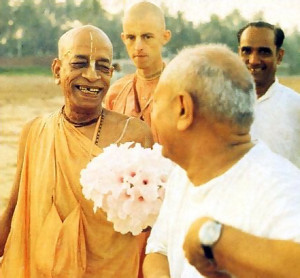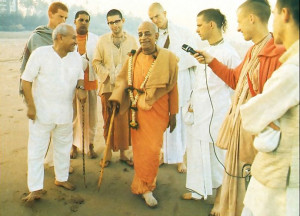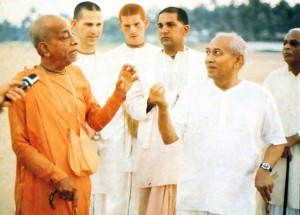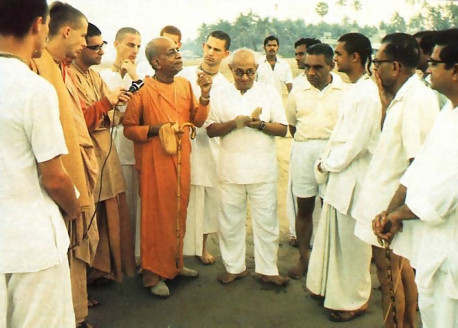A Bombay doctor wins the title “big fool” and loves it.
by Dr. Chaturbhai P. Patel
It was early one morning at about 5:30 during the Bombay winter, on the smooth sands of Juhu Beach, that we first met. I and my friends Babubhai, Bhanubhai, and Chandubhai were walking from the north end of the beach toward the south, and just opposite the Sun ‘n’ Sand Hotel, in the semidarkness of dawn, the saintly figure of a sannyasi [renunciant] came within the purview of my vision. It was His Divine Grace Srila Prabhupada.
He was walking with a group of devotees from the opposite direction, from south to north, striding toward us about twenty feet away. As soon as I saw him my feet automatically turned toward him, and my friends followed me. And lo! He too started coming toward me. We met halfway.
My friends and I were all Vaisnavas [devotees of Krsna], born in Vaisnava families, and we had been taught from our early childhood how to pay respect and obeisances to a saint, a sannyasi, or a sadhu. So we fell at his feet—all of us—one after the other. He put his pious hand on my head and inquired about my name, profession, and so on. I answered all with full respect. From there we all returned to the temple, joining him in a procession, and from that time he and I started knowing each other more and more, and we came nearer and nearer to each other.
I was educated in the Western way and am greatly influenced by the modern methods of imbibing knowledge. So at our first meeting I started arguing with him, sometimes foolishly, sometimes methodically and logically. The first epithet I received from him was “You are a mudha, a big fool.” Considering my respectable qualification of doctorate from one of the world’s most renowned universities, I went into a fit of laughter, and he too rejoiced and laughed. And there you are. We soon became very close.
The many such occasions we shared opened vistas for us to know each other more and more and generated greater and greater love between us. He was a pious, venerable saint to me; I was a mudha, a big fool, to him. But he loved me dearly—so much so that if he did not see me for a day on the Juhu sand, he would make urgent inquiries about me.
After our first few meetings a regular program for our having his sat-sanga [spiritual association] on Juhu Beach came into being automatically. Every day my friends and I would rejoice at his frank and sweet talks about the superiority of bhakti-yoga [devotional service] and atma-vidya [self-knowledge]. And I, for arguing with him, used to get my special epithets: “mudha” and “rascal.” Then both of us would laugh to our hearts’ content. And so we had our daily routine on Juhu Beach as long as he was in Bombay.
As I already mentioned, I was born into an orthodox Vaisnava family, and right from the early age of ten or eleven I was taught to get up every day before 4:00 a.m., take a bath, say prayers to Krsna, read Bhagavad-gita, water the sacred tulasi plant, and then do yoga exercises and pranayama [breathing exercises] to keep body and mind fit. This has been my daily routine even until today, and now I have entered my seventieth year.
But until my talks with Srila Prabhupada on the Juhu sand, I had not received and understood the real essence of the teachings of the Gita in the true sense. I soon became a life member of the Hare Krsna movement. As a member I got a copy of Bhagavad-gita As It Is, and I started reading it with gusto. I compared Srila Prabhupada’s commentary with the commentary of the great Vaisnava acarya [exemplar] Ramanuja, and I found that both are truly equal and parallel to each other. Srila Prabhupada: a real saint and a true acarya.
 Now very great respect, love, and devotion developed in me for this saint/yogi/acarya. I saw that his daily life mirrored the Bhagavad-gita, the great song of Lord Krsna, and I used to feel an acute sense of dejection when he would go away from Juhu and deprive me of his sat-sanga. I would eagerly wait for his early arrival in Bombay and would keep on inquiring about him from the devotees. When he was there it was the greatest occasion of my life. We used to have sweet talks, slow walks, and sharp arguments with loving quarrels, and I used to get my regular epithets of “mudha” and “rascal.”
Now very great respect, love, and devotion developed in me for this saint/yogi/acarya. I saw that his daily life mirrored the Bhagavad-gita, the great song of Lord Krsna, and I used to feel an acute sense of dejection when he would go away from Juhu and deprive me of his sat-sanga. I would eagerly wait for his early arrival in Bombay and would keep on inquiring about him from the devotees. When he was there it was the greatest occasion of my life. We used to have sweet talks, slow walks, and sharp arguments with loving quarrels, and I used to get my regular epithets of “mudha” and “rascal.”
Not all days were smooth sailing. One day we had a gust of fiery arguments and a small quarrel—with respect, of course, on my side for him, and with tender love on his side for me. The next day, not as usual, I, instead of walking on the sand, sat with my friends away from his path so that he might not see me. Then, when he came onto the sand for his usual walk, he started searching for me all around, and not finding my whereabouts he started inquiring, “Where is Dr. Patel?” Someone showed him where I was sitting—rather hiding—and lo! he started coming toward me with his band of devotees. I felt extremely ashamed and got up immediately and ran toward him. I fell at his feet and he gave me his benediction. What a saint he was! For him there was no friend or foe: all were equal. A godly personality indeed!
One day I requested him to sanctify my place of residence with his pious feet and to do sankirtana [congregational chanting of Hare Krsna] and take prasadam [sanctified food] with all the devotees of the Juhu temple. He readily agreed. He graced my house with his presence and sanctified it. A true devotee of Lord Krsna is a true representative of the Lord; in his presence we all felt as if Lord Krsna were there. That is the blessing of a true devotee of Lord Krsna.
Some time thereafter I began going to his residential quarters in the temple, accompanying him on his walk from the temple to Juhu Beach, and then walking with him back to the temple. This became a regular routine whenever he was in Bombay. One day I went to his quarters in the early morning and he was still in bed. The attendants would not let me in, not even into the anteroom.
While I was talking with the attendants he must have awakened and heard my voice. He spoke out: “Is it Dr. Patel? Doctor Sahib, come here into my room.” I went in. He was lying on his bed telling his beads. The bed was covered all around with a mosquito net. I touched his pious feet and stood near the end of the bed. He invited me to sit on the bed near him. I wouldn’t do that, as he was a saint. He said, “I want to tell you a secret.” And what was that secret? “Look,” he said, “we were brothers in our previous birth.”
I said, “I don’t know.”
“Don’t you see,” he said, “we are so much attracted to each other. You come so early from your home to see me, and I also await for your arrival here.”
I was stunned and stood speechless. I submitted.
One day he inquired about my full name. I said, “My name is Chaturbhai Purushottamdas Patel.”
He said, “Patel is your surname, indicating you are a village headman’s son.”
“Yes.”
“Then your father’s name is Purushottamdas, that is, ‘servant of Purushottama, Lord Krsna.'”
I agreed.
“Then your name should be Chaturbhujanand—that is, ‘the joy of four-handed Lord Visnu’—rather than Chaturbhai.”
“No,” I said, “I am Chaturbhai. Chatur means ‘clever,’ and bhai means ‘brother.’ So my name means ‘clever brother of yours.'”
There was a big burst of laughter amongst all of us. I was his intelligent brother from his previous birth, but I became his mentally initiated disciple, a confirmed devotee of Lord Krsna and His incarnations. Srila Prabhupada was a sannyasi and an acarya, while I was a full-fledged grhastha [householder] living at home, but still, by his grace, my mind was fixed on the sacred feet of Lord Krsna.
Every third year an extra month is inserted into the lunar calendar to bring it into line with the solar calendar. As per astronomical calculations, one year sacred Sravana was the month that came twice. The first month of the double month is called purusottama-masa, and devotees of Lord Krsna observe it by fasting, praying, and reading Srimad-Bhagavatam. The last day of this month was somavati-amavasya, a very auspicious occasion. On this day all religious people take a bath in the early morning in the sea, or in a river or sacred lake.
I proposed that on that auspicious day Srila Prabhupada take a dip in the sea along with me and the others. He agreed at once. We all planned to go to the sea with extra clothes, take a bath, and change. He accompanied us, but just near the edge of the water someone suggested that he not take a bath in the sea, since he had had a coronary episode some time back. So he halted then and there and would not enter the water. He pondered for a while and then suddenly asked me to bring some water in my palm and pour it on his head. He said, “That is as good as a bath on this auspicious day.” Very intelligently, he found the means, and I obliged him. He was pleased. I touched his feet and felt satisfaction at having taken a bath in the sea with him on a very auspicious day.
Thus I had ample opportunity to have his sat-sanga, both in the temple and during our walks on the seashore. He liked to sit in my car and be driven by me to the temple. This was our regular program every day. Then I would touch his feet, leave him at the temple, and go home or to my work at my clinic.
He knew Bengali, and I knew Gujarati. Sometimes I would speak to him in Gujarati, and understanding me fully, he would reply in Bengali, which I in turn could understand. He could not speak Gujarati and I could not speak Bengali, but we could still understand each other very well. So sometimes we would converse in this way.
Chandubhai and I had nicknamed one of Srila Prabhupada’s young sannyasis “Major Domo,” for he was really a dominating personality among all the devotees. I told Srila Prabhupada, and he started to use the nickname himself. At least in our presence he would address that sannyasi as Major Domo, and we all used to laugh. Srila Prabhupada was such a noble person with childlike innocence.
I cannot forget my life’s most precious moments with Srila Prabhupada. In my busy life as a medical man, these were my best times. He rectified and sanctified the entire span of my life. He took me to be his brother from his previous life—and that is greatly auspicious for me.
* * *
The following conversation between
Srila Prabhupada and Dr. Patel
took place in March of 1974.
Srila Prabhupada: If you want to worship Krsna, you should worship Him directly; you shouldn’t worship the demigods—just as if you want to give some food to eat, you should give it to the mouth, not to the rectum. [Laughter]
Dr. Patel: But there is a way of feeding through the rectum—
Srila Prabhupada: To give someone food, there is only one hole: the mouth. You cannot say that because there are so many holes in the body, any hole will do.
Dr. Patel: That is not the real argument—
Srila Prabhupada: Worship of the demigods is avidhi-purvakam [improper].
Dr. Patel: But through them one can worship God.
Srila Prabhupada: No. Everyone is part and parcel of God, but not everyone is God. That is the proper understanding. Every hole in my body is part of my body, but when food is to be taken, it is only through this [points to his mouth], not another hole.
Dr. Patel: But you can give food in the vein.
 Srila Prabhupada: But that is not the proper way. That is avidhi-purvakam
Srila Prabhupada: But that is not the proper way. That is avidhi-purvakam
Dr. Patel: But in the Bhagavad-gita Krsna Himself says, “Worship of the devas [demigods] is worship of Me.”
Srila Prabhupada: No, no. Krsna says,
ye ‘py anya-devata-bhakta
yajante sraddhayanvitah
te ‘pi mam eva kaunteya
yajanty avidhi-purvakam
“Worshiping the demigods is seva [worship] of Me—but it is avidhi-purvakam [improper].” Earlier He says, mat-sthani sarva-bhutani na caham tesv avasthitah.
Dr. Patel: Can you translate that?
Srila Prabhupada: “Everything is connected with Me, but I am not everything.” Nobody can exist without Krsna, but that doesn’t mean everybody is Krsna.
Dr. Patel: But there is nobody other than Krsna.
Srila Prabhupada: No, no. Na caham tesv avasthitah: “I am not everybody.”
Dr. Patel: As I was reading in the Bhagavata today, everything is emanating from Krsna; even the jivas [souls] are part and parcel of Krsna.
Srila Prabhupada: That does not mean Krsna is a jiva.
Dr. Patel: Nothing can exist without Krsna.
Srila Prabhupada: That’s all right. Everything is material energy, but that does not mean the land is the sea. That is nonsense. Do you say the land and the sea are the same?
Dr. Patel: Yes.
Srila Prabhupada: That is nonsense.
Dr. Patel: It is not nonsense, and I will give you an argument. As a scientist I’ll tell you. You break the atoms—
Srila Prabhupada: You are the lowest scientist. No, no. no! I cannot hear this nonsense. If you say the sea and the land are the same, this is complete nonsense.
Dr. Patel: It is nonsense in the present circumstances, but—
Srila Prabhupada: Any circumstances, any circumstances. We admit that the land and the sea are both matter, but you cannot say land is water, water is land. You cannot say that.
Dr. Patel: Would you please give me a decent hearing?
Srila Prabhupada: Everything is matter; that is all right.
Dr. Patel: That is right; that is what I want to say.
Srila Prabhupada: That I admit. But the difficulty with the mayavadis [impersonalists] is that they do not distinguish between the varieties.
Dr. Patel: Matter is made of maya [material energy]. So we are all mayavadis—all of us—you and me, because we are talking of maya. Nothing can happen without the energy of God.
Srila Prabhupada: That’s all right. But you cannot avoid the varieties. In your body, you have a head, you have a hand, and so on. Everything is the body, but if I point to your hand and ask, “What is that?” and you only say, “It is my body,” that is nonsense.
Dr. Patel: How can it be nonsense?
Srila Prabhupada: It is nonsense. This is the head, this is the hand, this is the leg [Pointing to the various parts of his body]—
Dr. Patel: And the whole thing is the body.
Srila Prabhupada: This is called unity in variety.
Dr. Patel: Shall I speak?
Srila Prabhupada: Yes—but you cannot say the head and the leg are the same. You cannot say that.
Dr. Patel: Shall I talk now? When this body was being manufactured in the womb—
Srila Prabhupada: I know: it was just a lump at first. [Pauses] But it became variegated.
Dr. Patel: Or take the example of the seed. In the seed there is a whole banyan tree. The Upanisads give this example: from a small seed a big banyan tree has come out—
Srila Prabhupada: That is all right.
Dr. Patel: So the seed is the real thing. And that seed is Krsna. So everything is Krsna.
Srila Prabhupada: Again “Everything is Krsna.” Again the same nonsense, the same nonsense. Krsna says. “I am not everything” (mat-sthani sarva-bhutani na caham tesv avasthitah).
Dr. Patel: Na ca mat-sthani bhutani. Krsna corrects Himself in the next verse.
Srila Prabhupada: No. it is not a correction. Fools simply cannot understand. Krsna is clear: “Although everything exists in Me, I am not everything.”
Dr. Patel: Still, “Everything exists in Me.”
Srila Prabhupada: Yes. Just like in this hotel [Pointing to a nearby hotel], there is so much furniture, there are so many rooms. But if you say everything is the hotel, that is nonsense.
Dr. Patel: But without the furniture the hotel cannot be, without the rooms the hotel cannot be—
Srila Prabhupada: [To the others] This man is less intelligent.
Dr. Patel: That is what I am.
Srila Prabhupada: Yes. If you say the furniture is the hotel, that is less intelligent.
Dr. Patel: But if you take out the furniture, the hotel will not be a hotel any more.
Srila Prabhupada: That’s all right, but you cannot say the furniture is the hotel—
Dr. Patel: But that is also an argument.
Srila Prabhupada: That is a nonsense argument: “Hotel is furniture.” You cannot say everything is the hotel. “The furniture is the hotel. The doorman is the hotel. The food is the hotel.” What is this? There must be varieties.
Dr. Patel: We are trying to dig to the seed of the tree of varieties.
 Srila Prabhupada: But you do not know how the tree is manifested. Therefore you are less intelligent.
Srila Prabhupada: But you do not know how the tree is manifested. Therefore you are less intelligent.
Dr. Patel: I am very less intelligent. The tree is manifested from the seed.
Srila Prabhupada: That’s all right. That everyone knows. But when the tree is grown you cannot say the leaf is also the seed, the fruit is also the seed, the trunk is also the seed. This is nonsense.
Dr. Patel: This is what the Vedas say—
Srila Prabhupada: No, that the Vedas do not say.
Dr. Patel: You understand it differently; I understand it differently.
Srila Prabhupada: How can you say everything is the same? There is variety. This is called acintya-bhedabheda-tattva philosophy: God is simultaneously one with everything and different from everything. This is Caitanya’s philosophy.
Dr. Patel: That is the philosophy?
Srila Prabhupada: Yes. Take the same example as before: the water is matter, and the land is also matter. As matter they are one, but the water is different from the land, and the land is different from the water. Simultaneously one and different. You are simply thinking abheda [nondifference]. That is your deficiency.
Dr. Patel: No, no. I will try to understand your bheda [difference] also, but for me abheda is more important at the present.
Srila Prabhupada: That means you are less intelligent.
Dr. Patel: I don’t mind becoming the least intelligent. Why less? [Laughter]
Srila Prabhupada: But you should come to this understanding: that in the abheda [oneness] there is bheda [variety]. It is a very simple thing. My hand is not different from my body, but still my hand is not my body. Even a child can understand. But you are not submissive; therefore you do not understand.
Dr. Patel: No. [Insistently] I am extremely submissive. But I cannot submit without understanding. That is what I was taught in my school.
Srila Prabhupada: Because you do not submit, you do not understand.
Dr. Patel: But I will not submit without understanding.
Srila Prabhupada: No, no. Tad viddhi-pranipatena. Pranipata: first of all you must surrender.
Dr. Patel: I am being pranipata. Do you think I am disrespecting you? If you think so, then please pardon me.
Srila Prabhupada: No, no. It is not a question of disrespecting. But there is no full surrender. You think that you know better than me.
Dr. Patel: I don’t think so.
Srila Prabhupada: Yes.
Dr. Patel: No, no. If you think that, I will not talk, starting from tomorrow.
Srila Prabhupada: No, no.
Dr. Patel: I want to learn.
Srila Prabhupada: That is very good. So don’t talk, simply hear; that will be beneficial.
Dr. Patel: But if I don’t talk—
Srila Prabhupada: No, simply hear; don’t talk. That will be your respect.
Dr. Patel: And when I want to make you talk, what will I do?
Srila Prabhupada: Your habit is that as soon as I begin talking, you immediately talk, without hearing. Therefore you do not understand.
Dr. Patel: In what way will I make you talk? You tell me the way—
Srila Prabhupada: Simply hear first of all.
Dr. Patel: Acha, let us hear.
Srila Prabhupada: Simply be patient. Then if you cannot understand, inquire. Don’t think, “I know better than him; therefore I shall talk.” That will never help you to understand.
Dr. Patel: Well, if you run away with the idea that I am thinking like that, you are wrong.
Srila Prabhupada: You are habituated to think like that.
Dr. Patel: I’m habituated, but I have all respect for you. Don’t say that I’m disrespectful.
Srila Prabhupada: No, no, I know that—
Dr. Patel: The idea that I’m disrespecting you—
Srila Prabhupada: I am simply pointing out your defects.
Dr. Patel: That’s all right. I am prepared to correct them. But if I don’t excite you, you keep mum. So how shall I excite you?
Srila Prabhupada: Put a question, and I shall answer it from the sastra [scriptures]. Any child can understand, if I ask him, “What is this?” “Hand.” “What is this?” “Head.” “What is this?” “Leg.” Does he say, “Body”? So you are speaking like less than a child.
Dr. Patel: That is what I am. That is what I am.
Srila Prabhupada: Yes. Arjuna in the beginning was arguing, but when he saw it was useless he said to Krsna, “Now I surrender to You.” That is required.
Dr. Patel: But you are so very hard and harsh.
Srila Prabhupada: I must be hard. The whole world is falling for this mayavada philosophy. Therefore I am very much hard. I don’t make any compromise with these mayavadi rascals. No. I’ll never do that. Even if I don’t make any disciples, I’ll be satisfied, but I cannot make any compromise with these rascals. I cannot. If I make one moon, that is sufficient; I don’t want many stars. That was my guru maharaja’s principle, and that is my principle. What is the use of any number of fools and rascals? If one man understands rightly, he can deliver the whole world.


Jai Prabhupada!
I am Dr Chaturbhai Patel’s daughter.All I remember I accompanying my father visiting Srila Prabhupad constant arguments between them.Prabhupada always ask me “ Who are you?” I still don’t know it’s answer.I am still ignorant but spiritual by inherent nature and upbringing of my spiritual father who left his legacy for ever.
Hare Krishna